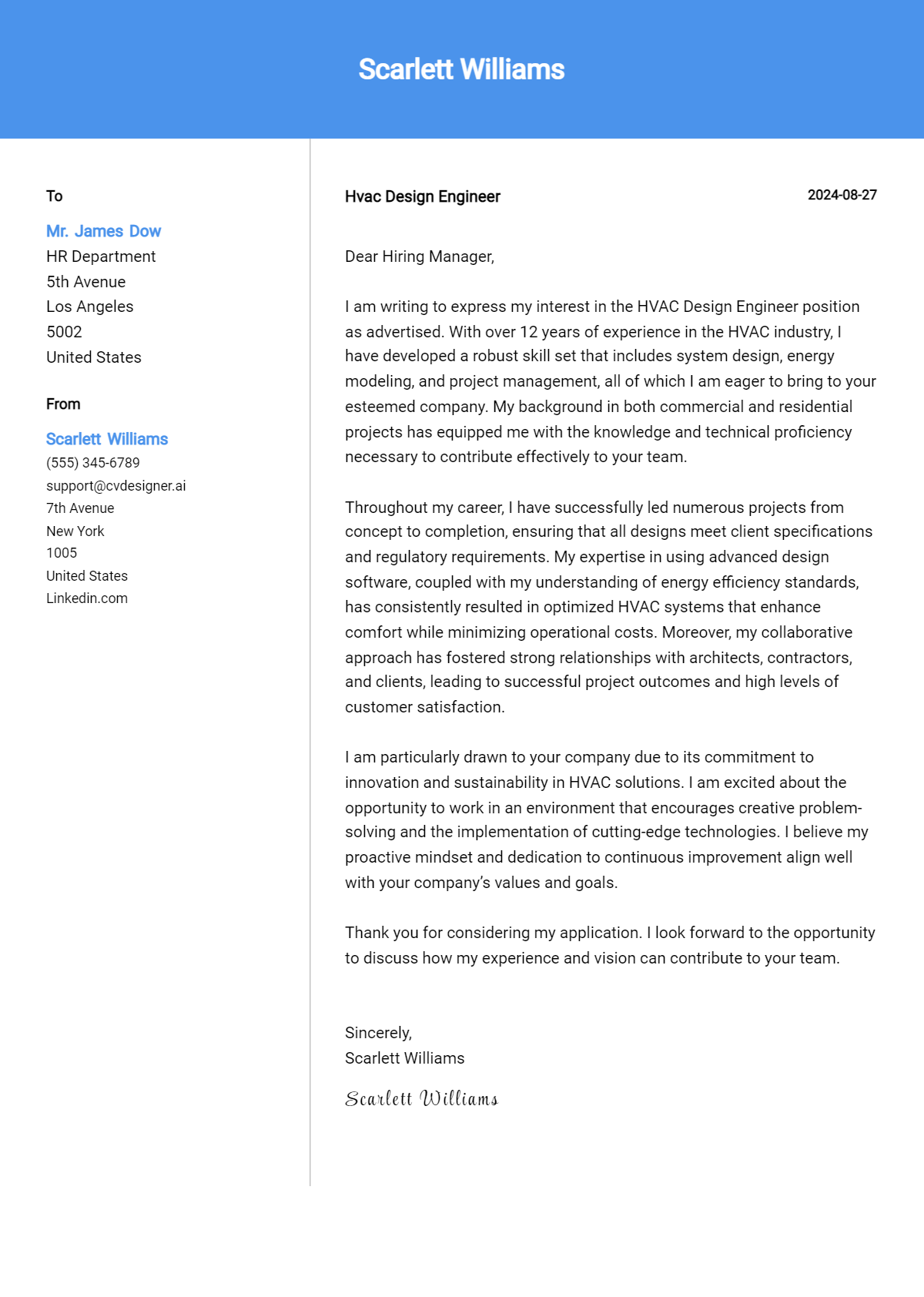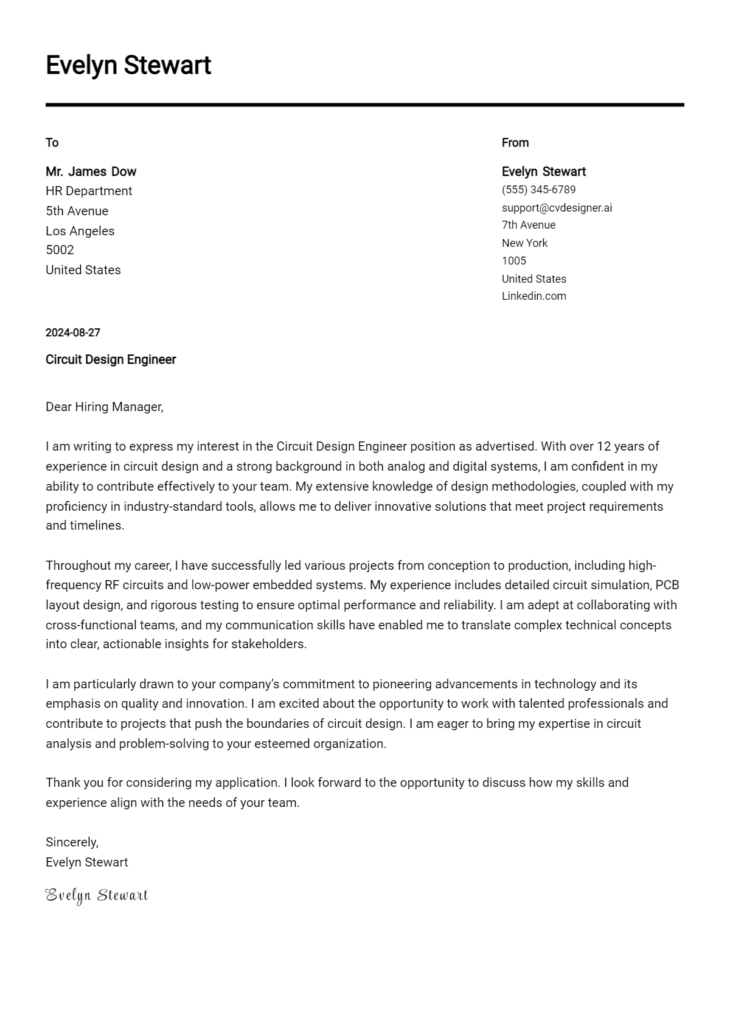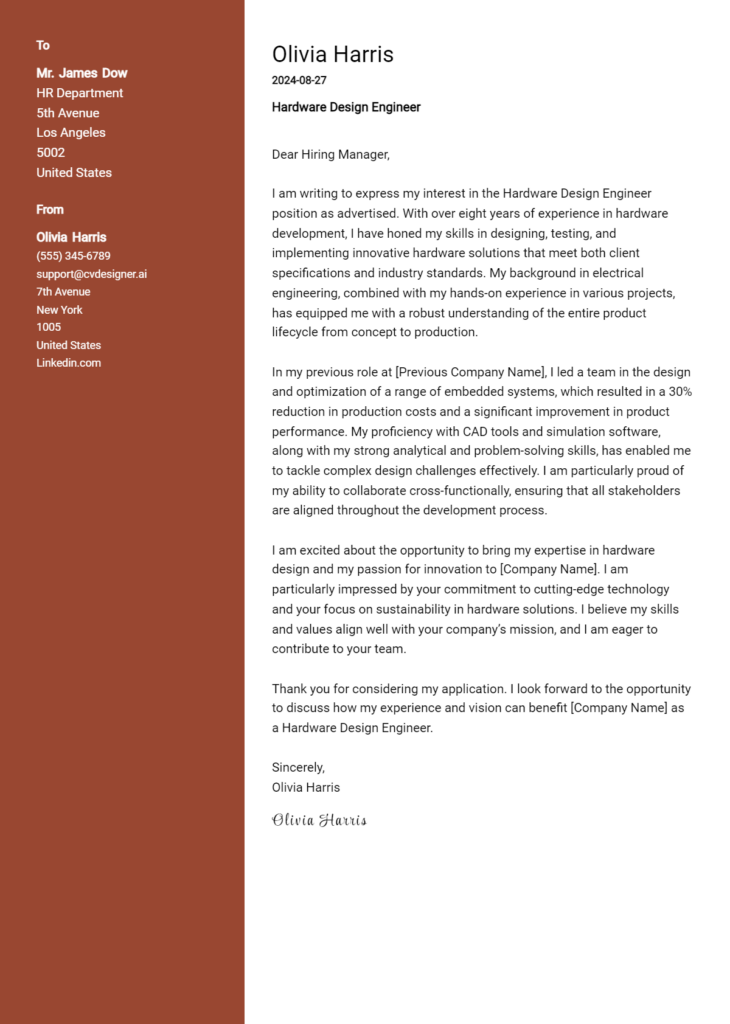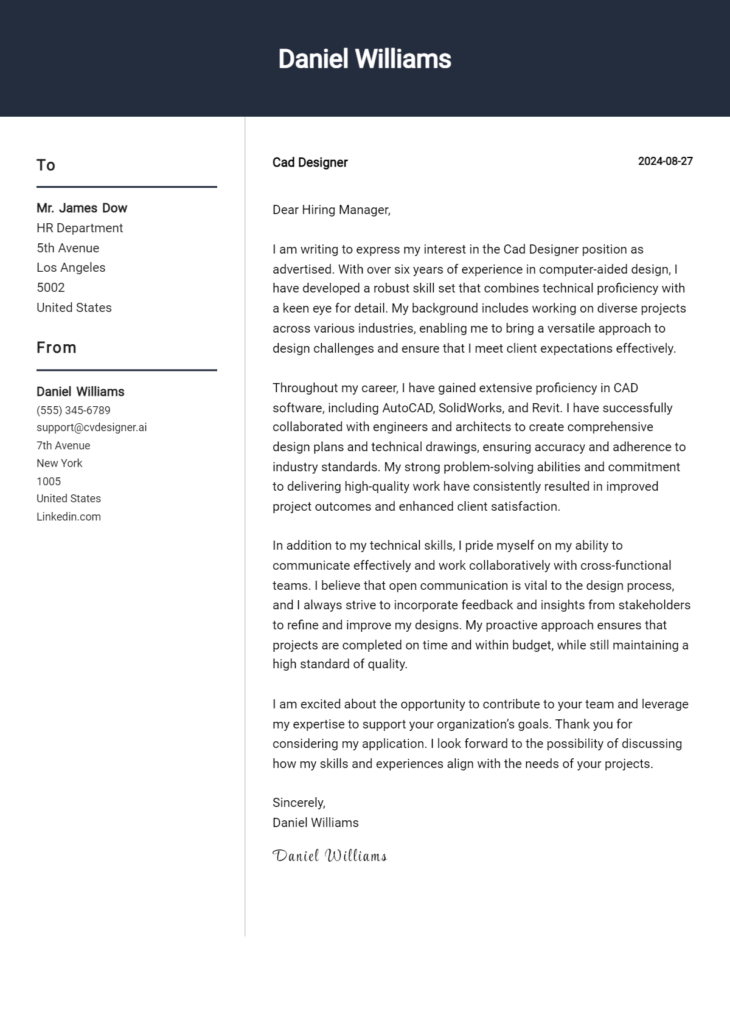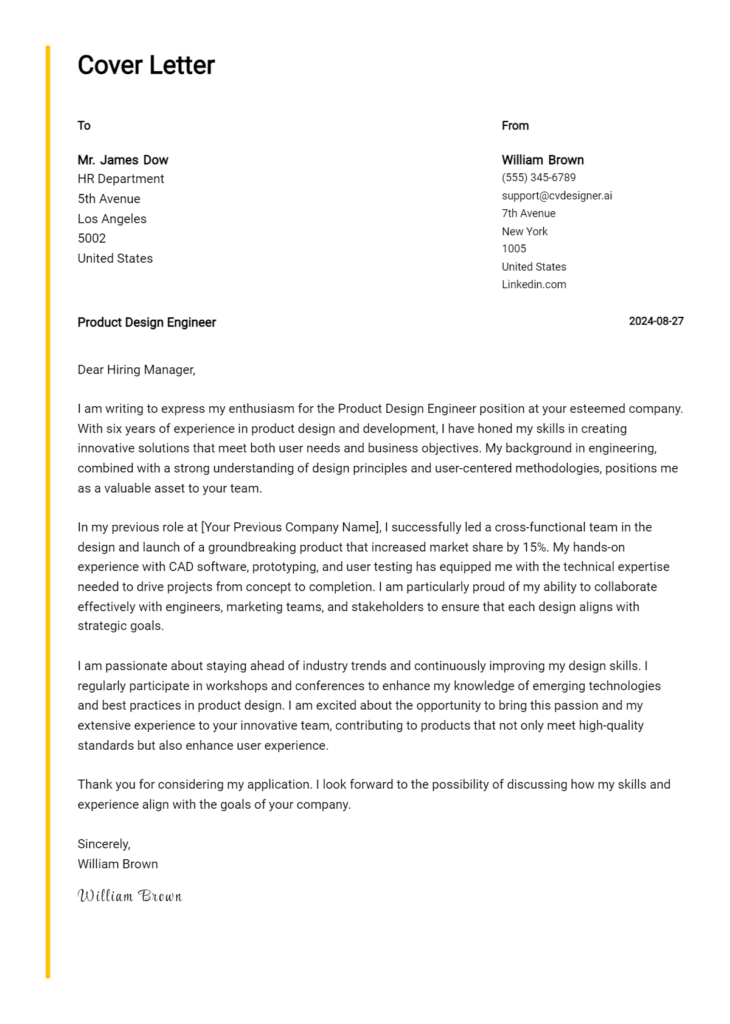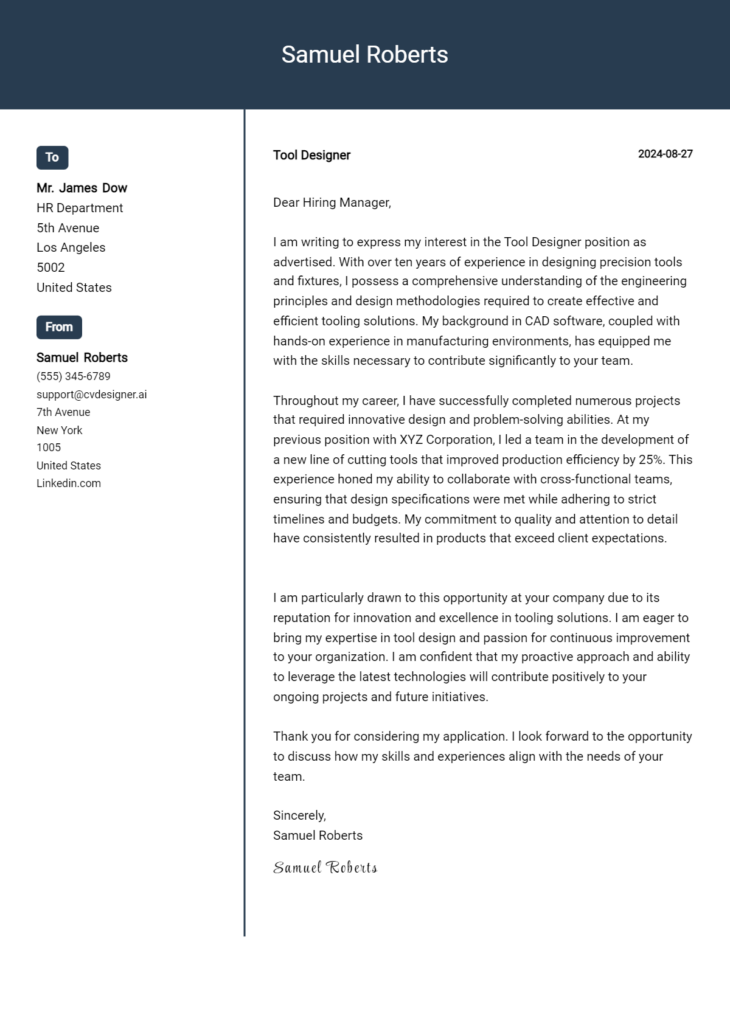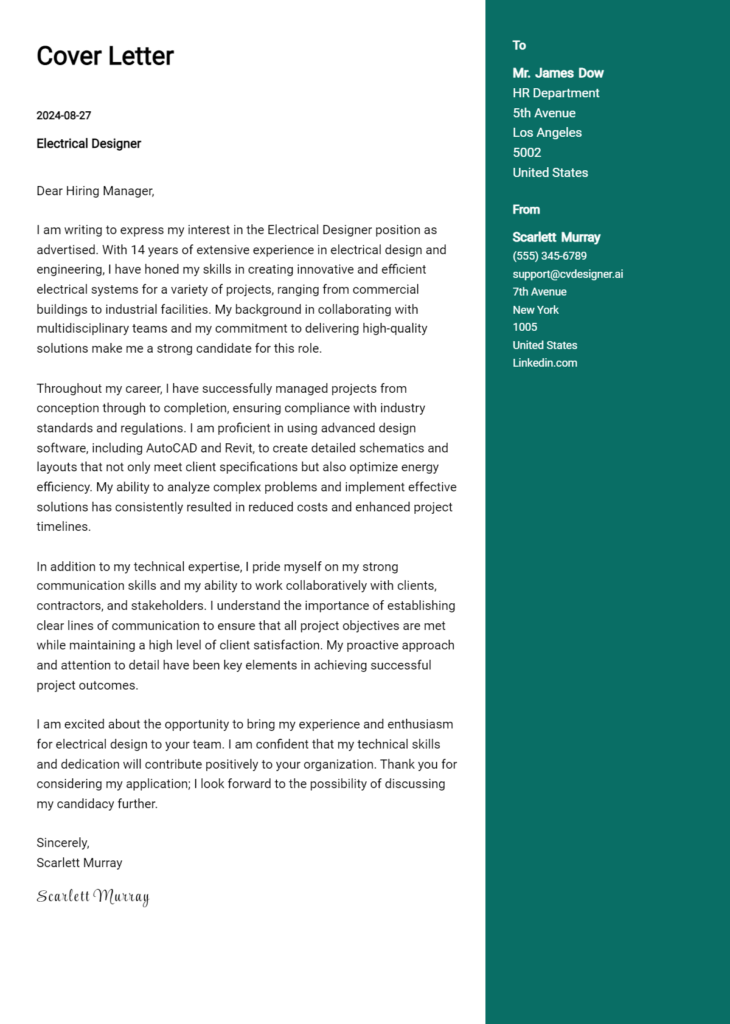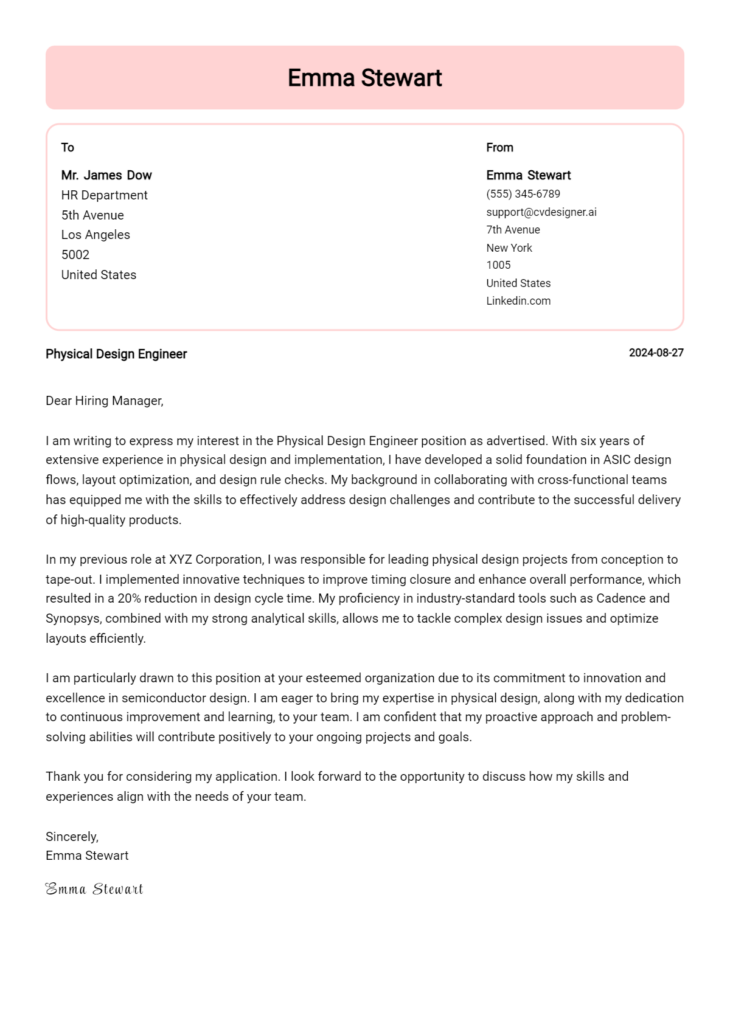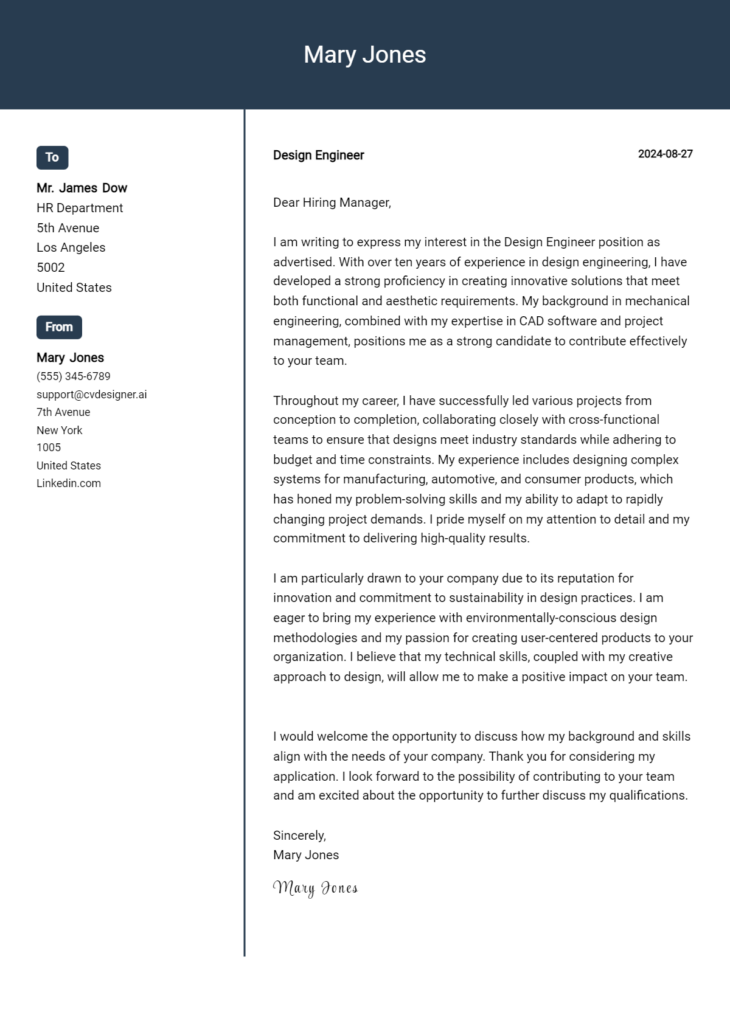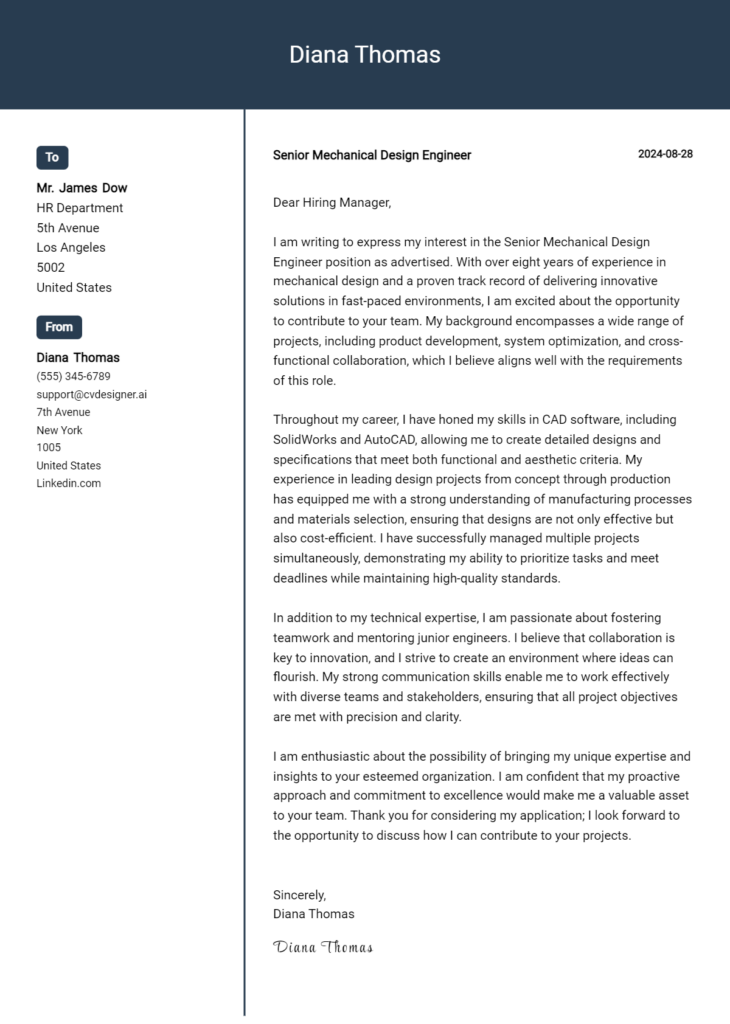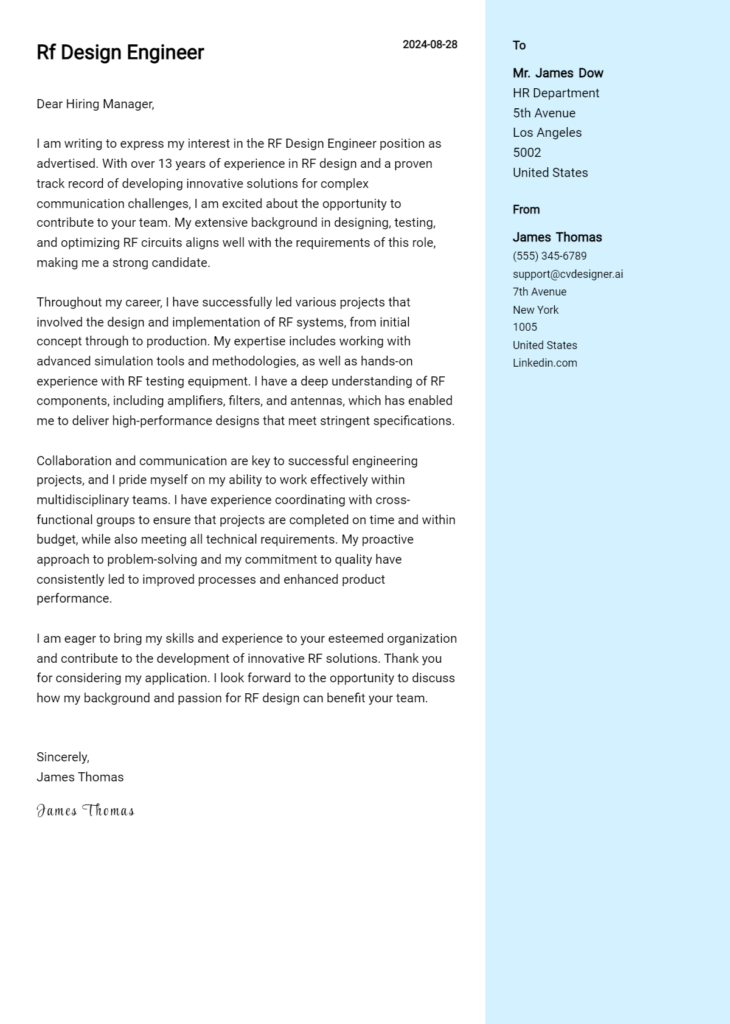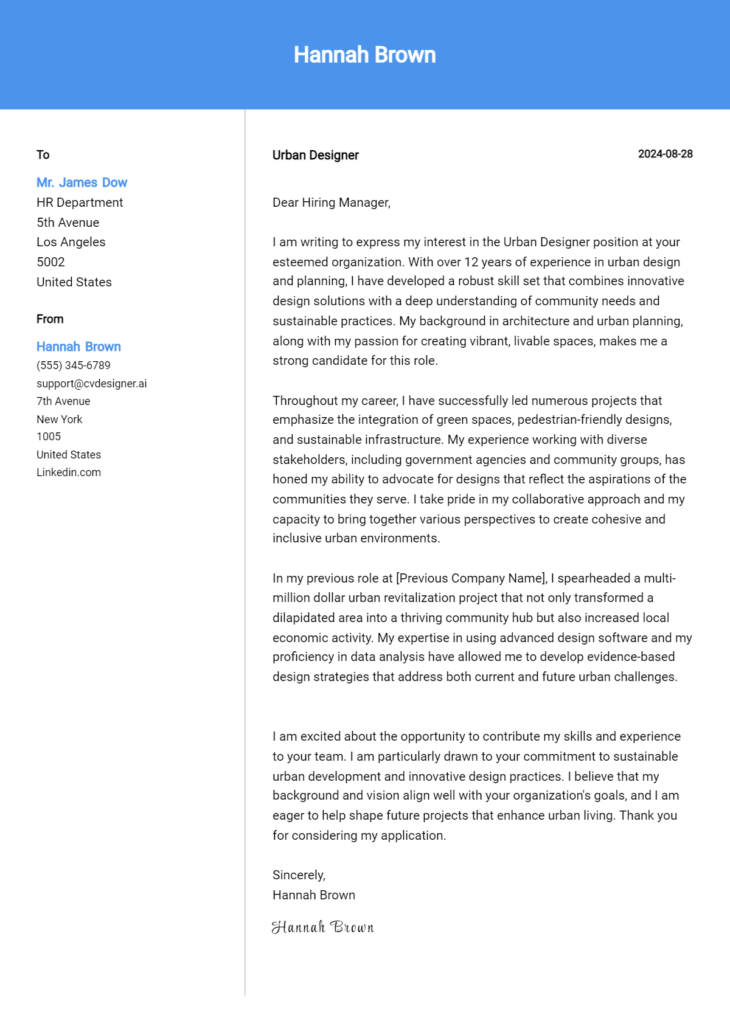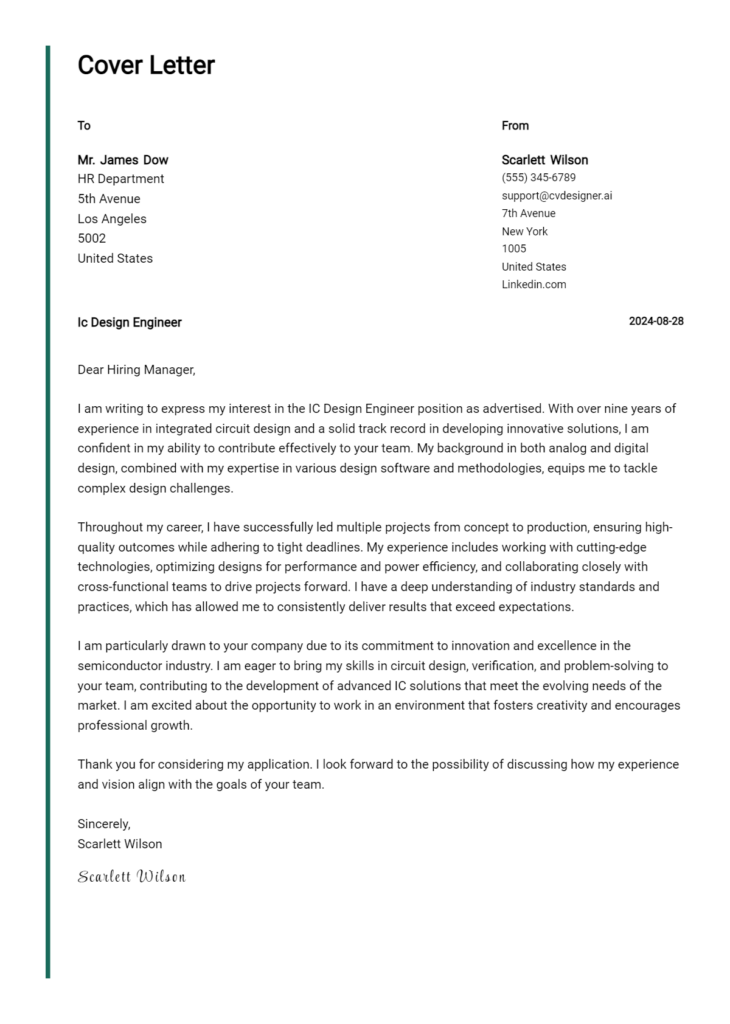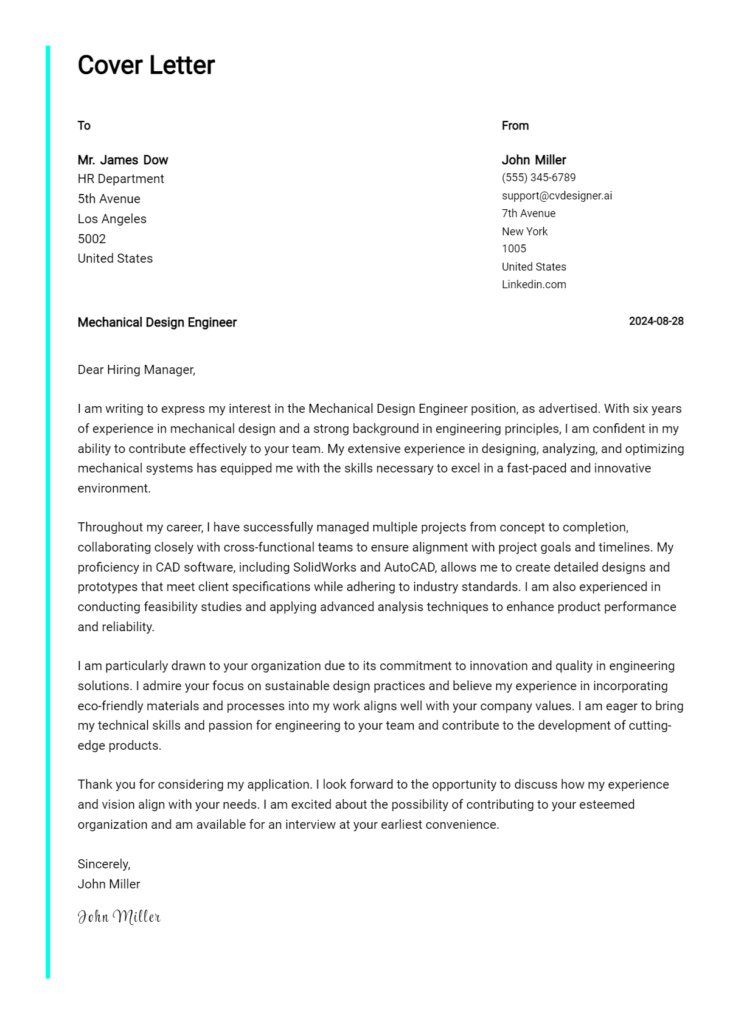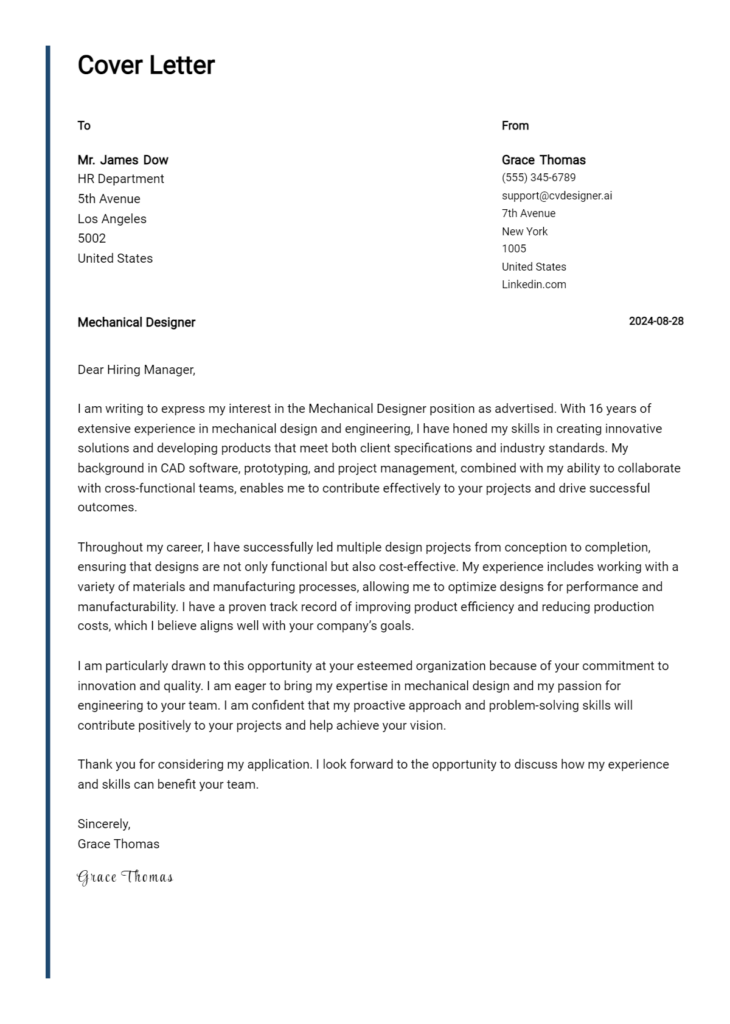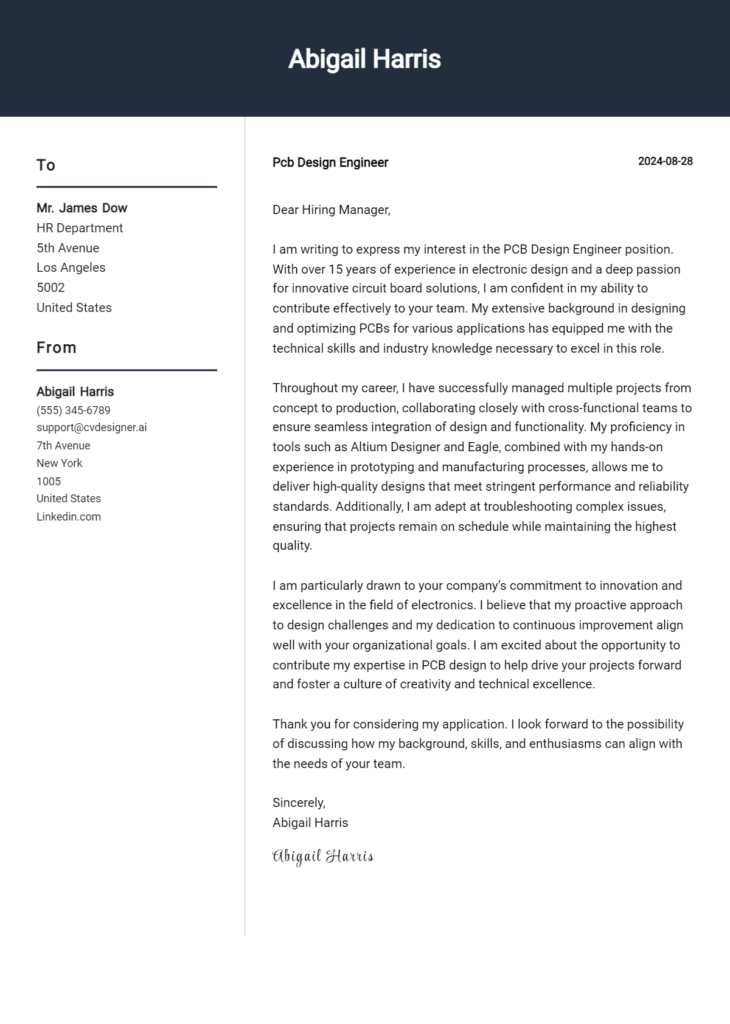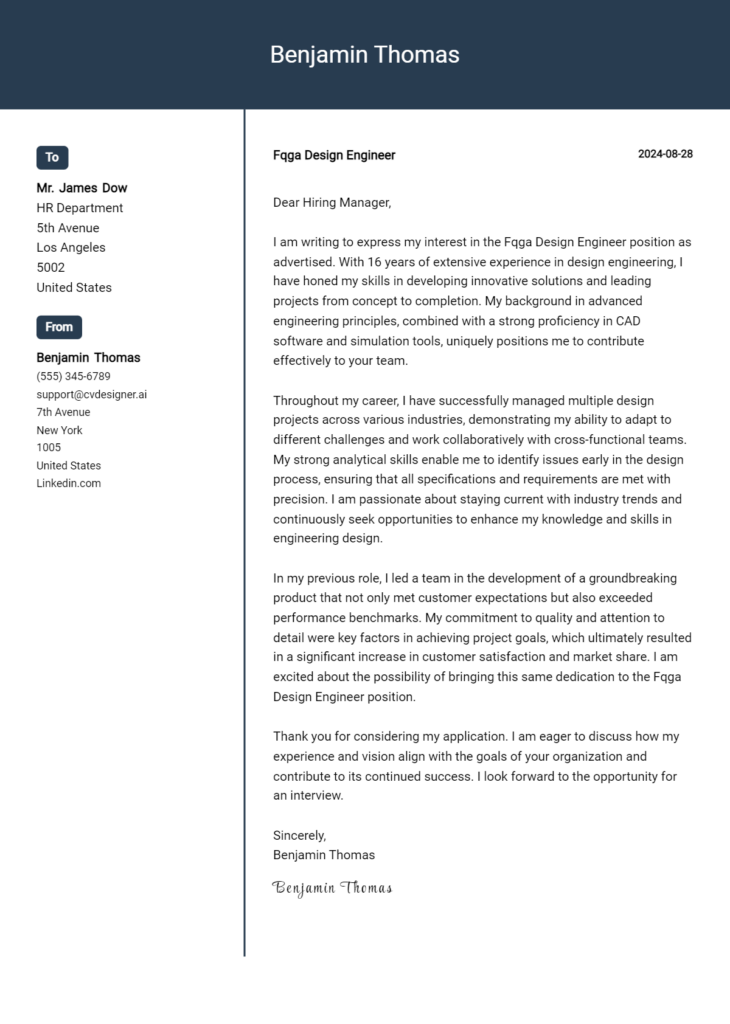Most Popular Hvac Design Engineer Cover Letter Examples
Explore additional Hvac Design Engineer cover letter samples and guides and see what works for your level of experience or role.
As an HVAC Design Engineer, your expertise in heating, ventilation, and air conditioning systems is crucial for creating efficient and sustainable environments. However, to make a memorable impression on potential employers, a well-crafted cover letter is essential. This article serves as a comprehensive guide to writing an effective HVAC Design Engineer cover letter that sets you apart from the competition. By diving into this guide, you'll uncover the essential elements of a compelling cover letter that showcases your skills and experiences. Here’s what we’ll cover:
- What does an HVAC Design Engineer cover letter accomplish?
- Key components of an HVAC Design Engineer cover letter.
- Formatting tips for an HVAC Design Engineer cover letter.
- Three different level cover letter examples for inspiration.
- Common mistakes to avoid when writing your HVAC Design Engineer cover letter.
- Key takeaways to ensure your cover letter stands out.
Whether you're a seasoned professional or just starting in the HVAC industry, this guide will provide you with the insights needed to create a powerful cover letter that opens doors to new opportunities. Let’s get started!
What does a Hvac Design Engineer Cover Letter accomplish?
A cover letter for a HVAC Design Engineer serves as a vital tool in presenting your qualifications and enthusiasm for the position to potential employers. It highlights your technical skills, project experiences, and understanding of HVAC systems, while also showcasing your ability to effectively communicate and collaborate within a team. By personalizing your cover letter, you can draw attention to specific achievements that align with the job requirements, making a compelling case for your candidacy. For those seeking guidance on crafting an impactful letter, a comprehensive cover letter guide can provide valuable insights, while a cover letter builder can assist in creating a polished final product that stands out in the competitive job market.
Key Components of a Hvac Design Engineer Cover Letter
- Personalized Greeting: Address the hiring manager by name to create a connection and demonstrate your interest in the specific position. Avoid generic salutations to make your cover letter stand out.
- Relevant Experience and Skills: Highlight your specific skills and experiences that are relevant to the HVAC design engineering role. Mention any projects you've worked on, technologies you're proficient in, and relevant certifications.
- Understanding of HVAC Systems: Demonstrate your knowledge of HVAC systems and design principles. Discuss how your expertise can benefit the company and contribute to their projects effectively.
- Call to Action: Conclude with a strong call to action, expressing your desire for an interview to further discuss how your qualifications align with the company's needs. This encourages the hiring manager to take the next step.
For additional tips on crafting your cover letter, check out these cover letter examples and learn about the best cover letter format.
How to Format a Hvac Design Engineer Cover Letter
As an HVAC Design Engineer, your cover letter should clearly demonstrate your technical expertise, project management skills, and dedication to energy efficiency. Here are some key points to include in your cover letter to make a strong impression:
- Begin with a strong opening that expresses your enthusiasm for the role and the company, and mention how your experience aligns with their needs.
- Highlight your educational background in mechanical engineering or a related field, emphasizing any relevant certifications such as LEED or ASHRAE.
- Detail your experience with HVAC system design, including specific projects where you successfully implemented innovative solutions or improved system efficiency.
- Discuss your proficiency in HVAC design software, such as AutoCAD, Revit, or HAP, and how you have utilized these tools to enhance project outcomes.
- Mention your understanding of local building codes and energy regulations, illustrating your ability to ensure compliance in all designs.
- Share examples of how you have collaborated with multidisciplinary teams, such as architects and electrical engineers, to deliver comprehensive HVAC solutions.
- Emphasize your problem-solving skills by describing a challenging project or situation you encountered and how you resolved it effectively.
- Highlight your commitment to sustainability and energy efficiency, discussing any initiatives you have led or participated in to reduce environmental impact.
- Include your ability to manage project timelines and budgets, showcasing your organizational skills and attention to detail.
- Conclude with a strong closing statement that reiterates your interest in the position and expresses your eagerness to contribute to the company's success.
Hvac Design Engineer Entry-Level Cover Letter Example #1
I am writing to express my interest in the entry-level HVAC Design Engineer position at [Company Name], as advertised on [where you found the job listing]. With a Bachelor’s degree in Mechanical Engineering from [Your University] and a strong foundation in HVAC systems design, I am excited about the opportunity to contribute to your team and support innovative projects.
During my academic career, I completed several projects that involved the design and analysis of HVAC systems, which honed my technical skills and deepened my understanding of thermal dynamics, fluid mechanics, and energy efficiency principles. One notable project was my senior design project, where I collaborated with a team to design an energy-efficient HVAC system for a local community center. This experience not only sharpened my design capabilities but also enhanced my teamwork and communication skills as we worked together to meet project deadlines and present our findings to faculty and peers.
Additionally, I completed an internship at [Previous Company Name], where I assisted in the development of HVAC design specifications, conducted load calculations, and participated in the modeling of HVAC systems using AutoCAD and Revit. This hands-on experience allowed me to apply my academic knowledge in a practical setting, as well as gain insights into industry standards and best practices. I am particularly proud of my contribution to optimizing ductwork layouts, which resulted in improved airflow efficiency.
I am eager to bring my passion for sustainable design and commitment to quality work to the HVAC Design Engineer role at [Company Name]. I am excited about the opportunity to learn from seasoned professionals, contribute to innovative projects, and help create environmentally responsible HVAC solutions. Thank you for considering my application. I look forward to the possibility of discussing how my background, skills, and enthusiasms align with the goals of your team.
Hvac Design Engineer Mid-Level Cover Letter Example #2
I am writing to express my interest in the HVAC Design Engineer position at [Company Name], as advertised on [Job Board/Company Website]. With over [X years] of experience in HVAC design and engineering, I have developed a robust skill set in system design, energy modeling, and project management that I believe aligns well with the needs of your team.
In my previous role at [Previous Company Name], I successfully led multiple HVAC design projects from concept to completion, ensuring compliance with industry standards and client specifications. One of my notable projects involved the design of a high-efficiency HVAC system for a commercial building, where I implemented innovative solutions that reduced energy consumption by 25%. My hands-on experience with AutoCAD and Revit allowed me to create detailed design drawings and coordinate with multidisciplinary teams effectively.
Additionally, I possess a strong understanding of building codes and regulations, which has enabled me to navigate complex compliance issues seamlessly. During my tenure at [Another Previous Company Name], I collaborated with architects and contractors to ensure that all HVAC systems were not only efficient but also integrated well with the overall building design. I also took the initiative to mentor junior engineers, sharing my knowledge of best practices in HVAC design and fostering a collaborative work environment.
I am particularly excited about the opportunity at [Company Name] because of your commitment to sustainability and innovation in HVAC solutions. I am eager to bring my expertise in energy-efficient design and my passion for advancing sustainable practices to your team. I am confident that my proactive approach and dedication to excellence will contribute positively to your projects.
Thank you for considering my application. I look forward to the opportunity to discuss how my background, skills, and enthusiasms can be aligned with the goals of [Company Name]. I am excited about the possibility of contributing to your team and am available for an interview at your earliest convenience.
Hvac Design Engineer Experienced Cover Letter Example #3
I am writing to express my interest in the HVAC Design Engineer position at [Company Name], as advertised on [Job Board/Company Website]. With over [X years] of extensive experience in HVAC design, system optimization, and project management, I am confident in my ability to contribute effectively to your team and help drive innovative solutions for your clients.
Throughout my career, I have successfully led the design and implementation of HVAC systems for a variety of projects, including commercial buildings, industrial facilities, and residential complexes. At [Previous Company Name], I managed a team of engineers in the design of an energy-efficient HVAC system for a [specific project], which not only met the client's specifications but also resulted in a [specific percentage] reduction in energy costs. My hands-on experience with advanced software tools such as AutoCAD, Revit, and EnergyPlus has enabled me to create precise designs and perform thorough analyses, ensuring that all systems are both effective and compliant with local regulations.
In addition to my technical expertise, I have developed strong project management skills that have been instrumental in delivering projects on time and within budget. I pride myself on my ability to collaborate with multidisciplinary teams, including architects, contractors, and clients, to ensure seamless project execution. My proactive approach to problem-solving and attention to detail have consistently allowed me to identify potential issues early in the design process, leading to improved outcomes and enhanced client satisfaction.
I am particularly drawn to [Company Name] due to its commitment to sustainability and innovation within the HVAC industry. I am excited about the opportunity to contribute to projects that prioritize energy efficiency and environmental responsibility. I believe that my background in designing sustainable HVAC solutions aligns perfectly with your mission, and I am eager to bring my experience to your esteemed organization.
Thank you for considering my application. I look forward to the opportunity to discuss how my skills and experiences can contribute to the continued success of [Company Name]. I am excited about the possibility of joining your team and helping to deliver exceptional HVAC designs that meet the evolving needs of your clients. Please feel free to contact me at [Your Phone Number] or [Your Email Address] to schedule a conversation.
Cover Letter Tips for Hvac Design Engineer
When crafting a cover letter for an HVAC Design Engineer position, it's essential to clearly convey your technical expertise, project experience, and understanding of HVAC systems. Start by addressing the hiring manager directly and expressing your enthusiasm for the role and the company. Highlight your relevant qualifications and experiences that align with the specific requirements of the job description. Use clear and precise language to demonstrate your problem-solving skills and ability to work collaboratively within a team. Remember to tailor your cover letter to the job you are applying for, showcasing how your background and skills make you an ideal candidate for the role.
Tips for Writing a Cover Letter as an HVAC Design Engineer:
- Tailor Your Letter: Customize each cover letter to reflect the specific job description and company values, demonstrating your genuine interest in the position.
- Highlight Technical Skills: Clearly outline your proficiency with HVAC design software, such as AutoCAD, Revit, or Trane Trace, and mention relevant certifications (e.g., LEED, ASHRAE).
- Showcase Project Experience: Provide examples of HVAC projects you have worked on, detailing your role, challenges faced, and successful outcomes.
- Include Soft Skills: Emphasize your communication, teamwork, and problem-solving abilities, as these are crucial for collaborating with architects, contractors, and clients.
- Quantify Achievements: Whenever possible, use numbers to illustrate your impact, such as energy savings achieved through your designs or project completion timelines.
- Express Passion for Sustainability: Highlight your commitment to energy-efficient designs and sustainable practices, which are increasingly important in the HVAC industry.
- Keep It Professional: Maintain a formal tone and structure, ensuring your letter is free of typos and grammatical errors.
- Call to Action: End with a strong closing statement expressing your eagerness for an interview and your willingness to discuss how you can contribute to the company’s success.
How to Start a Hvac Design Engineer Cover Letter
When crafting a cover letter for an HVAC Design Engineer position, it's essential to make a strong first impression that highlights your expertise and enthusiasm for the role. A well-written introduction can set the tone for the rest of your letter, showcasing your qualifications and interest in the company. Here are several effective cover letter introductions for an HVAC Design Engineer:
As a seasoned HVAC Design Engineer with over five years of experience in energy-efficient system design and implementation, I am excited to apply for the position at [Company Name]. My passion for innovative heating and cooling solutions aligns perfectly with your commitment to sustainability and excellence.
With a Master’s degree in Mechanical Engineering and extensive experience in HVAC system design, I am eager to bring my technical skills and creative problem-solving abilities to the HVAC Design Engineer role at [Company Name]. I have a proven track record of delivering projects on time and within budget while exceeding client expectations.
I am writing to express my interest in the HVAC Design Engineer position at [Company Name]. Throughout my career, I have developed a deep understanding of HVAC systems and a strong ability to collaborate with multidisciplinary teams, making me a valuable addition to your engineering team.
Having successfully completed numerous HVAC design projects that prioritize energy efficiency and cost-effectiveness, I am thrilled to apply for the HVAC Design Engineer position at [Company Name]. My background in AutoCAD and HVAC load calculation tools will enable me to contribute positively to your innovative projects.
I am excited to apply for the HVAC Design Engineer role at [Company Name], as I have a strong foundation in designing HVAC systems for commercial and residential buildings. My hands-on experience combined with my dedication to improving indoor air quality and energy efficiency makes me an ideal candidate for this position.
How to Close a Hvac Design Engineer Cover Letter
As you conclude your cover letter for a HVAC Design Engineer position, it's essential to leave a strong impression that reiterates your enthusiasm and qualifications. Here are some effective closing examples:
“I am excited about the opportunity to bring my innovative design solutions and technical expertise to your esteemed company, and I look forward to the possibility of discussing how I can contribute to your team.”
“Thank you for considering my application. I am eager to leverage my experience in HVAC design to help optimize your projects and ensure energy efficiency, and I hope to further discuss my qualifications in an interview.”
“I appreciate the opportunity to apply for the HVAC Design Engineer position and am enthusiastic about the chance to contribute to your company's success through my skills in system design and project management.”
“I am looking forward to the opportunity to discuss how my background in HVAC design aligns with the goals of your team. Thank you for your time and consideration.”
“With my passion for sustainable design and proven track record in HVAC projects, I am keen to bring my expertise to your organization. I hope to discuss my application with you soon.”
Common Mistakes to Avoid in a Hvac Design Engineer Cover Letter
When applying for a position as an HVAC Design Engineer, your cover letter is a crucial element that can set you apart from other candidates. A well-crafted cover letter not only highlights your technical skills and relevant experience but also demonstrates your professionalism and attention to detail. However, many applicants make common mistakes that can detract from their chances of landing an interview. To help you create a compelling cover letter, here are some pitfalls to avoid:
- Generic Greetings: Using a vague salutation like "To Whom It May Concern" instead of addressing the hiring manager by name.
- Neglecting to Tailor Content: Failing to customize the letter for the specific job or company, which can make it seem like a one-size-fits-all application.
- Overly Technical Language: Using too much jargon or technical terminology that may not be understood by all readers, especially if they are not engineers.
- Lack of Specific Examples: Not providing concrete examples of past projects or achievements that demonstrate your skills and impact in previous roles.
- Ignoring Job Requirements: Overlooking key qualifications or responsibilities mentioned in the job description and not addressing them in your letter.
- Poor Formatting: Submitting a cover letter that is poorly formatted, with inconsistent fonts, sizes, or spacing, which can make it difficult to read.
- Typos and Grammatical Errors: Submitting a letter with spelling mistakes or grammatical errors, which reflects poorly on your attention to detail.
- Being Too Lengthy: Writing a cover letter that is excessively long, which can lose the reader's interest; aim for a concise yet informative approach.
- Negative Language: Including negative comments about past employers or experiences, which can create a bad impression.
- Lack of a Strong Closing: Failing to end with a call to action or expressing enthusiasm for the role, which can leave the reader wanting more.
By avoiding these common mistakes, you can create a strong cover letter that effectively showcases your qualifications and makes a positive impression on potential employers.
Key Takeaways for a Hvac Design Engineer Cover Letter
In conclusion, crafting a compelling cover letter is essential for an HVAC Design Engineer to stand out in a competitive job market. Highlighting your technical skills, experience, and knowledge of HVAC systems will demonstrate your suitability for the role. It's also important to express your passion for energy efficiency and innovative design solutions, as these are key aspects of modern HVAC engineering. Utilizing resources such as cover letter templates can help ensure your letter is professionally formatted and tailored to the specific position you're applying for.
To further enhance your application, consider using a cover letter builder that allows you to create a personalized and impactful letter quickly. By integrating your unique experiences and qualifications with a polished presentation, you increase your chances of making a strong impression on potential employers. A well-structured cover letter not only showcases your technical expertise but also reflects your commitment to contributing to the success of their team.
